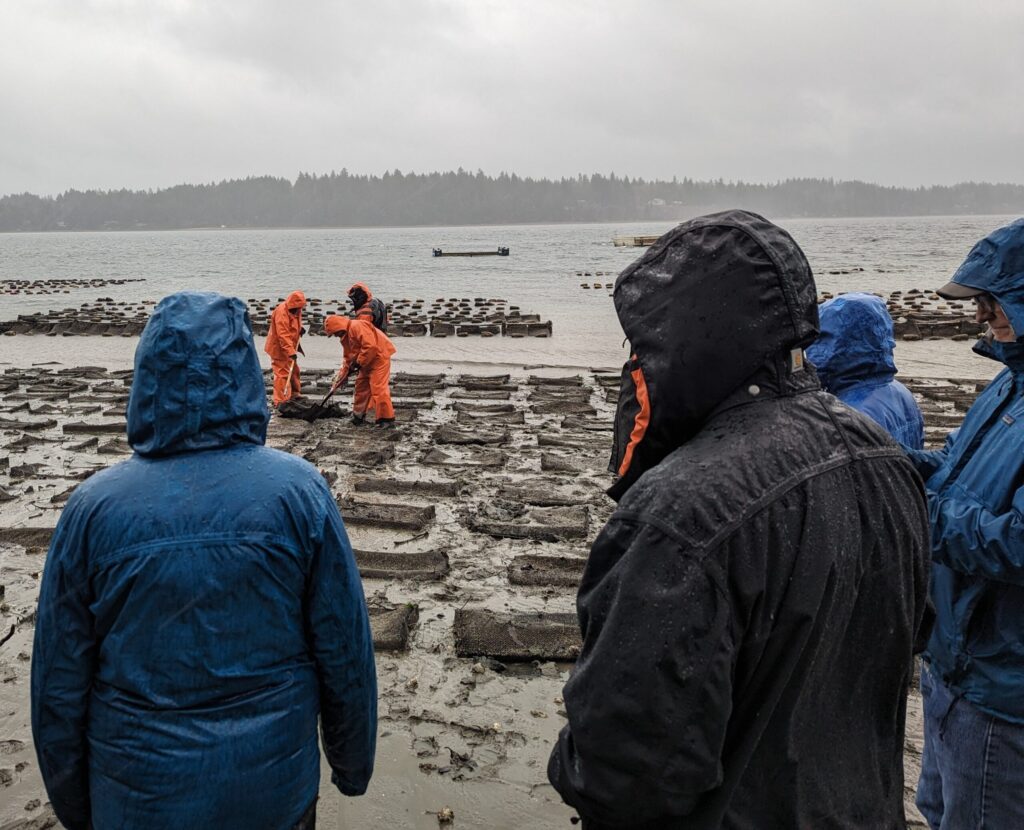There’s nothing like a good torrential downpour to bond a newly formed team.
When the skies opened during a group visit to a local oyster farm, it broke the ice among the diverse crew assembled by PEI to write a statewide Career and Technical Education (CTE) framework for the aquaculture and fisheries industry.
“There is often a field trip involved with these writing workshops, not only because it informs the work but because it increases collegiality among our writers,” says PEI’s Project Specialist Michelle Townshend. “This is a creative process and there has to be a modicum of trust. Standing outside during a rainstorm was a great way to bond.”

The deluge occurred as the group was learning about the Chelsea Farms, a second-generation, locally owned oyster, shellfish, and geoduck farm and restaurant, and its program to employ high school students and recent graduates as crew members.
“We were able to meet some of their workers that had started right out of high school and gradually moved up to the role of supervisor,” says Townshend. “It was great to hear from them directly.” Co-owner Shina Wysocki also provided valuable input on the most important entry-level skills for those joining the industry.
CTE frameworks are typically written at the local school or district level and often have limited reach across Washington. As a statewide entity, PEI has the advantage of being able to convene a wide array of perspectives to inform our writing process, including those of employers, K-12 education, the Office of the Superintendent of Public Instruction, tribes, and post-secondary educators. The resulting frameworks are designed to work both as standalone courses and as part of a network that helps students navigate their career choices. Through the courses, students can earn high school credit, job skills, and a document of competency from a local employer, and in some cases, dual credit at regional college.
“There is often a field trip involved with these writing workshops, not only because it informs the work but because it increases collegiality among our writers. This is a creative process and there has to be a modicum of trust. Standing outside during a rainstorm was a great way to bond.”
— PEI’s Project Specialist Michelle Townshend

The aquaculture and fisheries framework writing team included four teachers, a math standards expert, a tribal engagement specialist, and a tribal languages specialist from OSPI, fisheries biologists from the Colville Confederated Tribes, the hatchery division manager from the Washington Department of Fish & Wildlife, and the outreach team with a focus on research and hands-on learning from Pacific Shellfish Institute. Before the workshop, Townshend, PEI’s Executive Director Kathryn Kurtz, and Associate Director of Green Jobs Heather Spalding took a separate trip to Bellingham Technical College to learn about the school’s aquaculture and fisheries degrees and certificates and to see the state-of-the-art facility that the Ferndale School District is putting in place. OSPI’s Tribal Language Specialist Kayla Guyett opened the workshop with a story in Lushootseed.
The K-12 educators had a shared passion for the topic but varying levels of experience. “We had a teacher who is brand new and just getting up and running with her aquaculture setup, and one who’s been doing it for a long time and runs a hatchery through the school program that has around a million fish per year,” Townshend says. “We knew we needed to include this span of experience so the frameworks provide opportunities for teachers who are just getting started as well as those who may have been doing this work for 10 or 15 years.”
The PEI team created a spreadsheet of existing aquaculture and fisheries content covered in different courses currently available across the state. They then aligned course content with current industry jobs, post-secondary certifications, and degree programs so everyone could see where alignment happened, and what gaps existed. “It was clear that everybody had pieces of the puzzle,” Spalding notes, “but not everyone had every piece. We were able to build the framework units from that understanding of seeing entry-level job requirements that weren’t reflected in the courses.”
In the next phase, Townshend reviewed and incorporated the work of the writing team to build two draft frameworks that align with education and industry standards including 21st-Century Leadership Skills required by OSPI. She’ll get feedback from the team before submitting the framework to OSPI to be approved for statewide math and science equivalency credits. The equivalencies make it easier for any Washington district or skills center to meet student graduation needs and provide youth a pathway to natural resource careers. “The work that’s happening now is to review the draft with statewide partners that couldn’t attend the writing workshop to make sure we are including the important competencies students need to attain,” Townshend explains.
An exit survey demonstrates the process is valuable for writing workshop participants, offering an opportunity to connect with others in the field, and reflect on how best to provide a clear career path for educators, students, parents, and employers to see. “Some of the writers opened up about how they got into their jobs,” says Spalding, “and not all of those paths were traditional. By asking them to consider their own journeys, it helped the whole team think about how to support the next generation who will determine what the future of their profession will look like.”
This work is funded by a Career Connect Washington Program Builder grant through the Washington Employment Security Department.
